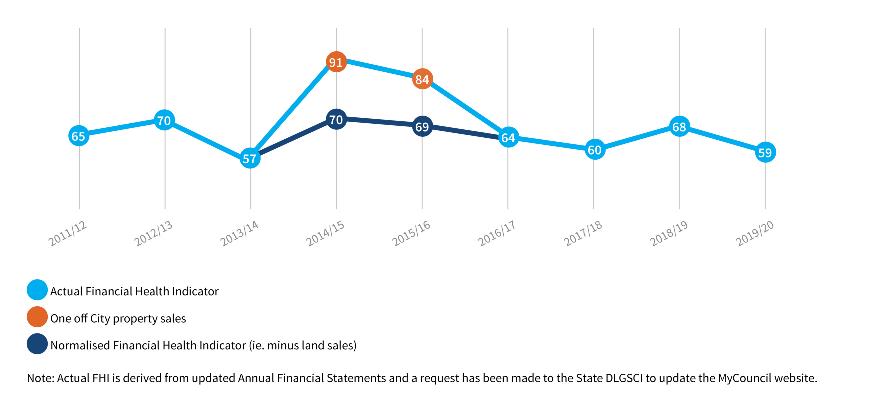City finances on steady path in COVID times
Sustainable and responsible financial management
The City prides itself on sustainable and responsible financial management and understands it is important to keep our community informed about the performance of the City to ensure we are meeting community expectations. This includes our financial performance.
In December 2020, Council adopted the City’s 2019/20 Annual Financial Report. The publicly available document details items including the City’s income, financial position, cash flows, assets, rating information and financial risk management.
In an extremely challenging pandemic year, the City prioritised supporting our local residents, community groups and businesses through a raft of measures represented in our Local Community Response and Relief Package.
A Financial Hardship Assistance Policy for ratepayers, residents, businesses, community groups and clubs experiencing financial hardship as well as the Buy Local Shop Local campaign designed to support business were cornerstones of our economic response to the pandemic. The City also supported residents, community groups and businesses by waiving a number of fees and charges, refunding booking fees and deposits for cancelled bookings in City properties and facilities, suspending debt collection and freezing City controlled commercial property lease and licence payments.
A balanced approach
Whilst the economic impacts of the pandemic have temporarily affected the City’s revenue streams, the City retains the capacity to deliver on new and maintained infrastructure which is a core service and requirement of the City.
The City’s 2020/21 Annual Budget represents a balance between rate relief for the community, further assistance for those facing financial hardship, carefully considered prioritisation of public spending, capital works that will improve the City’s financial position in the medium-to-long term, as well as generating financial activity to stimulate to local economy’s recovery from the impact of COVID-19.
Key projects – which include a proposed Recreation and Aquatic Facility, a Waterbird Refuge on South Perth Foreshore, community building and playground upgrades, CCTV, environmental restoration and road maintenance – offer significant public benefits, though they do not significantly improve the City’s FHI score. These projects, many of which the City has received State and Federal Government funding for, offer essential investments for the future.
Financial Health Indicator score
The City is open and transparent about its financial position and the WA Auditor General conducts annual financial audits into the City’s finances. As part of this stringent process, seven legislated financial ratios are calculated and audited. The seven ratios are used to calculate the Financial Health Indicator (FHI) score. The weighting assigned to the ratios in the FHI differ, the ‘Current Ratio’ for example carries a greater weighting than most other ratios.
In 2019/20 the City’s FHI score was calculated at 59, down from 68 in 2018/19. This is mainly attributable to the ‘Current Ratio’, affected by reduced cash balance a result of certain Council resolutions and the pandemic’s effect on the City’s revenue streams.
For example, the impact of the pandemic on Parking Management Revenue alongside a number of Council resolutions changing parking restrictions and further reducing parking revenue is conservatively estimated at a loss of $1.4 million. Had this reduction in revenue and the resulting reduction in the City’s cash balance not occurred, the City’s FHI score would be 66 instead of 59.
The scores of all local governments are published on the MyCouncil website. It is important to note that the City’s FHI scores for the years 2013/14, 2014/15, 2016/17 and 2017/18 are inaccurately reported on the Department of Local Government, Sport and Cultural Industries’ MyCouncil website.
The City has written to the Department of Local Government, Sports and Cultural Industries and sent emails on a number of occasions to request amendments to the incorrect scores. The City is still waiting for these inaccuracies to be corrected.
The FHI is best viewed as a trend over time. The scores are just one indication of a local government’s financial health. In recent years many professionals have questioned the FHI model, believing the ratios, as well as the model are fundamentally flawed and misleading. The main concerns of the FHI model relate to its technical design, the weighting of each ratio and the absolute benchmarks. Additionally, WALGA commissioned a review of FHI ratios and issued a series of recommendations.
A healthy future
The City’s finances have remained on steady path during the pandemic due to a planned approach to managing its finances. Guided by its Strategic Community Plan 2020-2030 and Corporate Business Plan 2020-2024, the City continues to plan for future generations, to develop new community infrastructure and provide services to improve the lives of residents and visitors.
As a City we are well-placed to continue our strong track record of sustainable financial management and responsible corporate citizenship, ready to respond to community needs and deliver support to the more than 44,000 residents and 4,900 local businesses that call our City home.
FHI scores
The adjusted FHI scores below show the steady trend of the City’s finances in accordance with its planned approach and adopted budgets, demonstrating that the City’s finances are managed in a sustainable and responsible way.
Geoff Glass
City of South Perth Chief Executive Officer
Media contact
- Phone 9474 0777
- Email media@southperth.wa.gov.au

